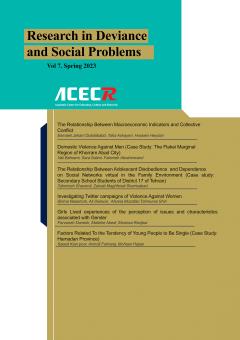Investigating Twitter campaigns of Violence Against Women
Subject Areas : Social problems related to media, communications and cyberspaceshima nasertork 1 , ali delavar 2 , afsaneh mozaffari 3 , tahmores shiri 4
1 - PH.D Student of communication Dept, Islamic Azad University, Science and Research Unit, Tehran, Iran.
2 - Professor of the Department of Psychology and Educational Sciences, Allameh Tabatabai University, Iran.
3 - Associate Professor, Communication Department, Islamic Azad University, Science and Research Unit, Tehran, Iran.
4 - Associate Professor, Department of Sociology, Islamic Azad University, Tehran Center Untit, Tehran, Iran.
Keywords: Violence, Women's Rights, Campaign, Twitter and Social Networks.,
Abstract :
One of the most important topics that social networks -Twitter- have paid attention to is violence against women in Iran. The most important theoretical support in the emergence of these campaigns is the reflection of the texts about violence against women. One of the most important factors in the emergence of such waves is the important activists in the field of these social networks, who use their followers to reflect these contents. The most important campaigns in terms of the number of tweets and retweets was the "Girls of the Revolution" campaign. The aim of the research is to analyze the performance of Twitter in reflecting the content of violence against women in Iran based on the most important campaigns that have emerged in the last decade. This issue was analyzed based on the theoretical foundations of types of violence and networked movements. The research method is the content analysis of tweets and hashtags related to campaigns from 2016 to 2016. The research results showed that the most important themes are about social and political violence against women. In this regard, some campaigns and hashtags have caused insecurities in the society the most important of which was the campaign of the girls of Enghelab Street in terms of the number of tweets and retweets. the analysis of the themes of tweets showed the absence of news, posts and tweets of people related to campaigns and hashtags.
آقابیگولی، عباس و کامران آقاخانی (1386) «بررسی پدیده همسرآزاري در شهر تهران در سال 1379»، مجموعه مقالات آسیبهاي اجتماعی ایران، انجمن جامعه¬شناسی ایران، تهران، آگه.
اعزازي، شهلا (1383) «ساختار جامعه و خشونت علیه زنان»، نشریه تخصصی رفاه اجتماعی، شماره 14، صص 59-96.
ابوت، پاملا و کلر والاس (1380) جامعه¬شناسی زنان، ترجمه منیژه نجم عراقی، تهران، نشرنی.
رحیمی، پریا (1397) مطالعه الگوهاي فعالیتهاي سایبري اکتیویستهاي حوزة زنان و نسبت آن با اکتیویسم در فضاي واقعی، پایاننامه کارشناسی ارشد، استاد راهنما عبدالله بیچرانلو، رشته ارتباطات اجتماعی، دانشکده علوم اجتماعی، دانشگاه تهران.
رهبری، مهدی (1393) جنبشهای اجتماعی: کلاسیک، مدرن، پست مدرن، تهران، کویر.
سازمان جهانی بهداشت (1380) خشونت علیه زنان، ترجمۀ شهرام رفیعی¬فر و سعید پارسی¬نیا، تهران، تندیس.
صفایی¬نژاد، قاسم (1395) «جریان¬سازی در فضای مجازی؛ با تأکید بر رسانههای اجتماعی»، ماهنامه مدیریت رسانه، شماره 26، صص 15-34.
علاسوند، فریبا (1392) زن در اسلام، ج 2، تهران، مرکز هاجر.
فرنچ، مارلین (1373) روان¬شناختی خشونت در خانواده؛ زنان کتک¬خورده، ترجمه مهدي قرچه¬داغی، تهران، علمی.
فیوضات، ابراهیم و رضا تسلیمی تهرانی و علی دادگر (1388) گاندی عدم خشونت و جنبشهای اجتماعی، مجله جامعه شناسی ایران، سال دهم شماره 3 (پیاپی 27، پاییز 1388)، صص 141-160.
کاستلز، مانوئل (1393) قدرت ارتباطات، ترجمه حسین بصیریان جهرمی، تهران، علمی و فرهنگی.
کوهن، جین ال (1386) فهم و مطالعه جنبشهای اجتماعی جدید/جین کوهن.
.
.
[و دیگران]، مترجم علی حاجلی، تهران، جامعه و فرهنگ.
گشنیزجانی، گلنار (1395) تیپولوژی بدن رسانهای و تحلیل کردارهای بدنی کاربران شبکه اجتماعی اینستاگرام، پایان نامه کارشناسی ارشد، رشته ارتباطات، استاد راهنما اعظم راودراد، دانشکده علوم اجتماعی، دانشگاه تهران.
گیدنز، آنتونی (1374) جامعه شناسی، ترجمه منوچهر صبوری کاشانی، تهران، نشرنی.
معتمدي مهر، مهدي (1380) حمایت از زنان در برابر خشونت سیاسی جنایی انگلستان، تهران، برگ زیتون.
هالدر، دباراتی و کی جیشانکار (1393) جرائم رایانهای و بزه¬دیدگی زنان (قانون¬ها، حقها و مقررات¬ها) ترجمة مهرداد رایجیان اصلی و حسین محمد کوره¬پز، تهران، مجد.
همتی، رضا (1383) «عوامل مؤثر بر خشونت مردان علیه زنان»، فصلنامۀ رفاه اجتماعی، شماره 12، صص 336-381.
Gheytanchi, Elham, David M. Faris and Babak Rahimi (2015) ‘Gender Roles in the Social Media World of Iranian Women’. In: David M. Faris and Babak Rahimi (eds) Social Media in Iran: Politics and Society After 2009. New York: SUNY Press, pp. 41–56.
Karimi, S. (2014) Iranian Women’s Identity and Cyberspace: Case study of Stealthy Freedom, journal of social science studies, 2(1) 221-233.
Press, S. (2011) Theories of social movements. Sociology Reference Guide. Pasadena, California• Hackensack, New Jersey: Salem Press, 5(2), 3-20.
Sovacool, B. K. (2022) Beyond science and policy: typologizing and harnessing social movements for transformational social change. Energy Research & Social Science, 94, 102857.
Yar, M. (2005) The novelty of ‘cyber crime’: An assessment in light of routine activity theory. European Journal of Criminology, 2(4), pp. 407-427. Retrieved from: DOI: 10.1177/147737080556056.


